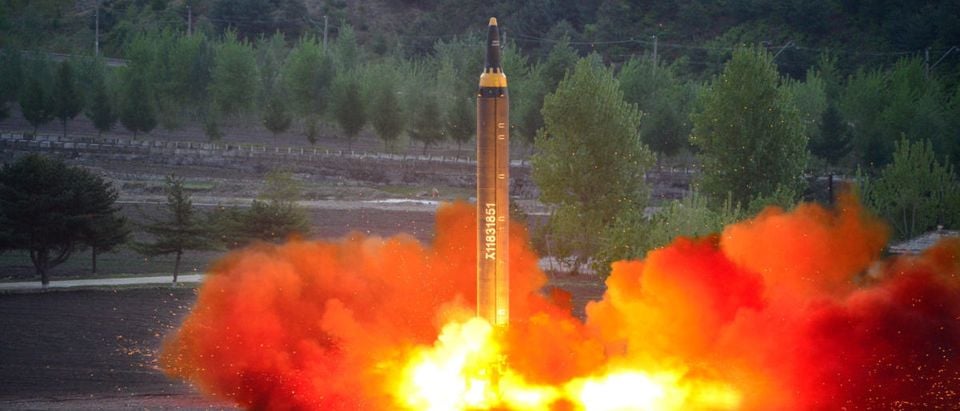The U.S. may soon face a tough decision if North Korea follows through on plans to fire a salvo of ballistic missiles into waters off U.S. territory in the Pacific.
North Korea warned this week that it is planning to launch four Hwasong-12 intermediate-range ballistic missiles (IRBM) into waters around Guam, home to numerous U.S. strategic military assets, including a collection of conventional and nuclear-capable bombers that can reach North Korea in a only a few hours. There are an estimated 7,000 U.S. troops and 160,000 civilians.
The Pentagon would not comment on whether or not the U.S. would move to intercept North Korea’s missiles if it follows through on its aggressive plans for a show of force. “We are always in a high-state of readiness,” Pentagon spokesman Marine Corps Lt. Col. Christopher Logan told The Daily Caller News Foundation. “We have the capability to counter any threat, to include those from North Korea.”
From South Korea to Guam, the U.S. and its allies have a strong, tiered missile defense system consisting of Aegis missile defense systems, Patriot systems, and Terminal High Altitude Area Defense (THAAD) batteries, the last of which would be best suited to intercepting an IRBM.
With two successful tests of the THAAD anti-missile system last month, this missile defense system has a perfect test intercept record of 15 out of 15.
Were the U.S. to open fire on Kim Jong-un’s missiles, it would send a message to the regime that not only are America’s conventional and nuclear forces superior to those of North Korea, but the U.S. also has the ability to repel anything the North can throw at it.
If the interceptors fail to take out even one of the missiles, though, problems quickly begin to mount. The U.S. has spent billions of dollars on its missile defense systems, and President Donald Trump announced Thursday that he has plans to spend billions more to strengthen them further.
A failed intercept, as the AP notes in a piece on whether or not the U.S. should intercept North Korea’s IRBMs, would be “humiliating.” It would also trigger fear and panic in American citizens who have slept better at night believing North Korea could never truly threaten American lives.
Failure would also likely be disconcerting to U.S. allies that rely on the U.S. for defense.
U.S. missile defense systems, like those used by our allies, have never been tested in combat, and some systems have spotty test records.
“People think missile defenses are a magic wand. They aren’t,” Jeffrey Lewis, the director of the East Asia Nonproliferation Program in the James Martin Center for Nonproliferation Studies at the Middlebury Institute of International Studies, told The Daily Caller News Foundation.
Kinetic missile defense is essentially hitting a bullet with another bullet.
“Let us say that there is someone on the other side of a large room shooting at you and you are shooting back. Maybe you could ricochet one of the bullets if you are an excellent marksman, but you are still going to get hit with other bullets,” Melissa Hanham, senior research associate in the East Asia Nonproliferation Program in the James Martin Center for Nonproliferation Studies, told TheDCNF. “In the best case scenario, [missile defenses] could protect some places some of the time. They could reduce casualties, but it’s not a force field.”
Even if the U.S. did shoot down North Korea’s missiles, such an act would undoubtedly raise tensions, potentially pushing North Korea to pursue an even more aggressive path to develop a reliable nuclear deterrent to counter U.S. military might.
Were the U.S. military to decide not to intercept North Korea’s missiles, avoiding the question altogether, the U.S. may set a new precedent for North Korean weapons testing. North Korea normally lofts its missiles to avoid upsetting its neighbors more than necessary. Now, the North is talking about launching them over Japan towards U.S. territory.
If the U.S. allows North Korea to take this step, it may redefine the way they do weapons tests. After the launch of the Hwasong-12 IRBMs, Pyongyang may choose to fire off a Hwasong-14 intercontinental ballistic missile, and then it will, perhaps, only be a matter of time before North Korea detonates a nuclear warhead over the ocean as some other countries have done.
Send tips to ryan@
All content created by the Daily Caller News Foundation, an independent and nonpartisan newswire service, is available without charge to any legitimate news publisher that can provide a large audience. All republished articles must include our logo, our reporter’s byline and their DCNF affiliation. For any questions about our guidelines or partnering with us, please contact licensing@dailycallernewsfoundation.org.


